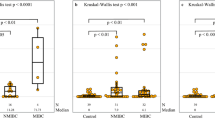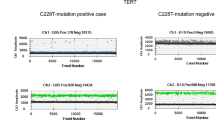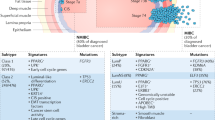Abstract
A phase l study using intravesical Ad-IFNαSyn3 for patients with bacillus Calmette-Guérin-resistant superficial bladder cancer showed a complete remission (CR) of 43% at 90 days after treatment with high levels of interferon-α (IFNα) being produced. Ad-IFNα kills bladder cancer cells by two apoptotic and one necrotic mechanism that can be measured by soluble forms of cytokeratin 18 (CK18) using M30 and M65 ELISAs, assays for caspase-cleaved (apoptotic) and uncleaved (necrotic) cell death, respectively. Therefore, we determined whether M30 and M65 levels in the urine after treatment could document all three mechanisms of cancer cell kill and also predict having a CR. High levels of both M30 and M65 were found in all patients within 24 h after treatment with all three types of cancer cell death occurring. Moreover, the return of both M30 and M65 levels in the urine to normal levels within 5 days or more after treatment was strongly associated with obtaining a CR (P=0.003). This is the first time that such assays have been used to study response to therapy in the urine of patients with bladder cancer and in the future may prove valuable in predicting clinical outcome.
This is a preview of subscription content, access via your institution
Access options
Subscribe to this journal
Receive 12 print issues and online access
$259.00 per year
only $21.58 per issue
Buy this article
- Purchase on Springer Link
- Instant access to full article PDF
Prices may be subject to local taxes which are calculated during checkout

Similar content being viewed by others
References
Dinney CP, Fisher MB, Navai N, O'Donnell MA, Cutler D, Abraham A et al. Phase I trial of intravesical recombinant adenovirus-mediated interferon-α2b formulated in syn3 for BCG failures in non-muscle-invasive bladder cancer. J Urol 2013; 190: 850–856.
Benedict WF, Tao Z, Kim CS, Zhang X, Zhou JH, Adam L et al. Intravesical Ad-IFN alpha causes marked regression of human bladder cancer growing orthotopically in nude mice and overcomes resistance to IFN-alpha protein. Mol Ther 2004; 10: 525–532.
Tao Z, Connor RJ, Ashoori F, Dinney CP, Munsell M, Philopena JA et al. Efficacy of a single intravesical treatment with Ad-IFN/Syn 3 is dependent on dose and urine IFN concentration obtained:implications for clinical investigation. Cancer Gene Therapy 2006; 13: 125–130.
Papageorgiou A, Lashinger L, Millikan R, Grossman HB, Benedict WF, Dinney CP et al. Role of tumor necrosis factor-related apoptosis-inducing ligand in interferon-induced apoptosis in human bladder cancer cells. Cancer Res 2004; 64: 8973–8979.
Zhang X-Q, Yang Z, Dong L, Papageorgiou A, McConkey D, Benedict WF . Adenoviral- mediated interferon α overcomes resistance to the interferon protein in various cancer types and has marked bystander effects. Cancer Gene Therapy 2007; 14: 241–250.
Zhang X-Q, Dong L, Chapman E, Benedict WF . Conditioned medium from Ad-IFN-alpha-infected bladder cancer and normal urothelial cells is cytotoxic to cancer cells but not normal cells: further evidence for a strong bystander effect. Cancer Gene Therapy 2008; 12: 817–822.
Zhang X-Q, Yang Z, Benedict WF . Direct gene transfer of adenoviral-mediated interferon α into human bladder cancer cells but not the bystander factors produced induces endoplasmic reticulum stress-related related cytotoxicity. Cancer Gene Therapy 2011; 18: 260–264.
Zhibo Y, Zhang XQ, Dinney CNP, Benedict WF . Direct cytotoxicity produced by adenoviral-mediated interferon α infection in interferon resistant cancer cells involves ER stress and caspase 4 activation. Cancer Gene Therapy 2011; 18: 609–616.
Fisher MB, Zhang X-Q, McConkey DJ, Benedict WF . Measuring soluble forms of extracellular cytokeratin 18 identifies both apoptotic and necrotic mechanisms of cell death produced by adenoviral-mediated interferon alpha: possible use as a surrogate marker. Cancer Gene Therapy 2009; 16: 567–572.
Linder S . Cytokeratin markers come of age. Tumor Biol 2007; 28: 189–195.
de Hass EC, di Pietro A, Simpson KL, Meijer C, Suurmeijer AJH, Lancashire LJ et al. Clinical evaluation of M30 and M65 ELISA cell death assays as circulating biomarkers in a drug –sensitive tumor, testicular cancer. Neoplasia 2008; 10: 1041–1048.
Acknowledgements
This study is supported by a GU SPORE in Bladder Cancer (P50 CA91846).
Author information
Authors and Affiliations
Corresponding author
Ethics declarations
Competing interests
The authors declare no conflict of interest.
Rights and permissions
About this article
Cite this article
Benedict, W., Fisher, M., Zhang, XQ. et al. Use of monitoring levels of soluble forms of cytokeratin 18 in the urine of patients with superficial bladder cancer following intravesical Ad-IFNα/Syn3 treatment in a phase l study. Cancer Gene Ther 21, 91–94 (2014). https://doi.org/10.1038/cgt.2014.1
Received:
Revised:
Accepted:
Published:
Issue Date:
DOI: https://doi.org/10.1038/cgt.2014.1
Keywords
This article is cited by
-
Next generation drugs in urothelial cancer: adenoviruses in the treatment of BCG-unresponsive nonmuscle invasive bladder cancer
memo - Magazine of European Medical Oncology (2023)
-
The development of interferon-based gene therapy for BCG unresponsive bladder cancer: from bench to bedside
World Journal of Urology (2019)



